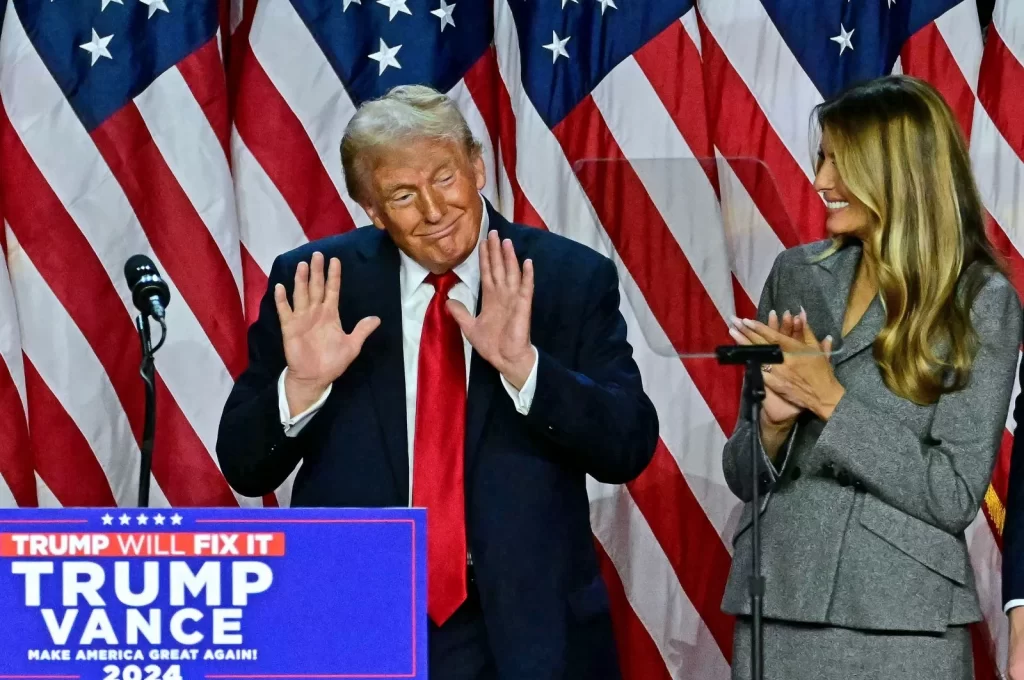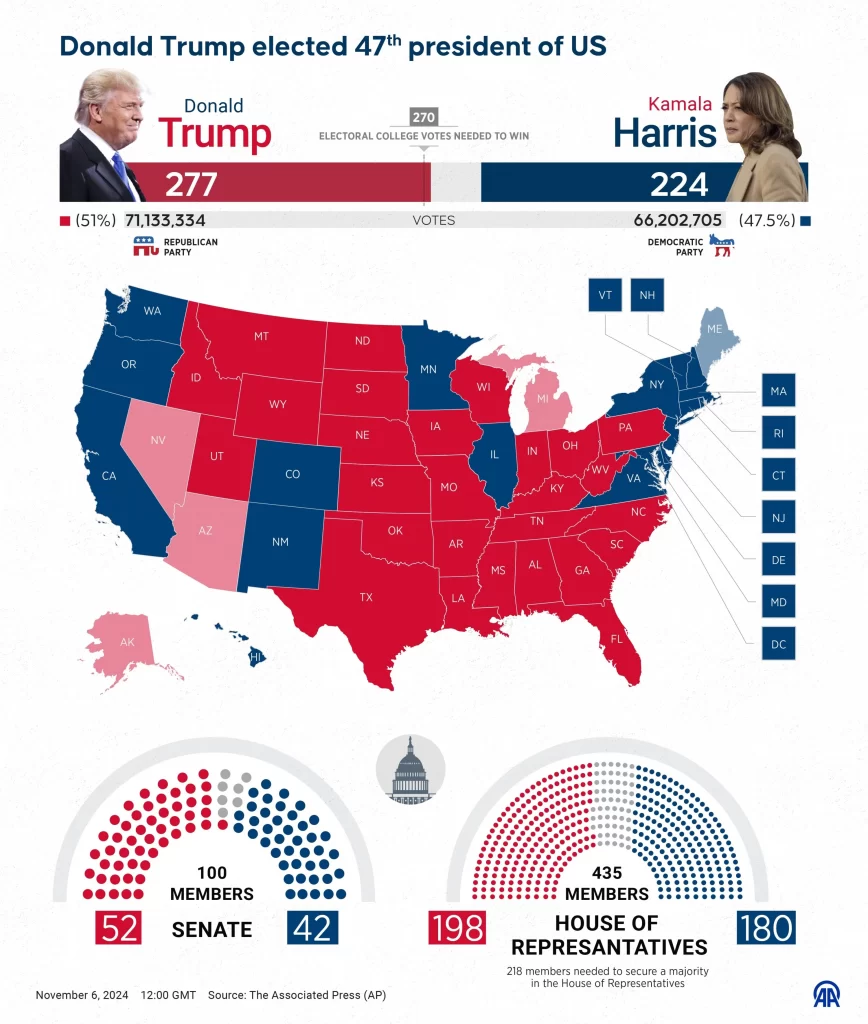In a twist that few saw coming, Donald Trump wins the White House again, returning to the Oval Office four years after his departure. Now 78, Trump’s comeback sets the stage for what could be a dramatic shift in U.S. governance, with potential impacts on both domestic policies and international relations.
After a campaign that only deepened the nation’s political divide, Trump wins the White House again by surpassing the required 270 Electoral College votes. With key states like Wisconsin tipping in his favor, Trump reached a lead of 279 electoral votes to Kamala Harris’ 223 by early Wednesday morning, while also holding a popular vote lead of around 5 million.
“America has given us a powerful mandate,” Trump declared to a cheering crowd at the Palm Beach County Convention Center, celebrating his return.

Recomended Article: If Trump Becomes President: A Geopolitical Analysis
Economic Concerns Lead Voters to Choose Trump
According to Reuters/Ipsos polls, jobs and economic stability were top issues for voters this time around. Despite record-breaking stock prices, wage growth, and low unemployment, inflation concerns left many Americans frustrated with the Biden administration. More voters said they trusted Trump over Harris to manage these issues, likely contributing to his win.
Interestingly, Trump wins the White House again partly thanks to gains among Hispanic voters and lower-income households—groups traditionally aligned with Democrats. His loyal base of rural, white, and working-class voters also showed up in force, demonstrating consistent support despite his challenges.
This comeback is especially notable given Trump’s low approval ratings, two impeachments, and ongoing legal battles, including a May conviction over hush money payments. His win is expected to influence U.S. policies on trade, climate, taxes, and immigration. His planned tariffs could spark trade disputes with China and other allies, while his corporate tax cuts might increase national debt. He also has promised mass deportations for undocumented immigrants.
Harris Faces Challenges in Tight Race
Kamala Harris’s campaign had a tough road, with a short 15-week sprint that struggled to build momentum on key issues like the economy and immigration. Throughout her campaign, Harris warned that Trump’s presidency posed risks to democratic principles, emphasizing the possibility of unchecked power.
Exit polls from Edison Research showed that nearly 75% of voters felt democracy was “under threat,” underscoring the deep divide in the country. Trump’s campaign, characterized by strong language, amplified this split. He criticized the immigration system and warned of economic challenges, often casting some of his political rivals as “enemies within.”
Despite his legal challenges, Trump managed to become only the second president in U.S. history to win a second term after leaving office, joining Grover Cleveland in this unique achievement.

A Campaign Marked by Surprises and Drama
Trump’s campaign saw its share of drama.
This year alone, he faced a conviction by a New York jury for falsifying business records. In July, a bullet grazed his ear at a rally, and in September, another assassination attempt was thwarted. Trump linked these events to what he said was inflammatory rhetoric from Democrats, including Harris.
In the midst of this, Biden stepped down from the race, citing a lackluster debate performance against Trump. Harris quickly took up the mantle, raising over $1 billion in record time and closing the gap with Trump in polls. Meanwhile, Elon Musk’s financial backing helped boost Trump’s momentum, with his social media platform X amplifying pro-Trump messaging.
As Election Day drew near, Harris reminded voters of past criticisms from former Trump officials who had called him a fascist. She aimed to resonate with undecided voters concerned about the state of democratic integrity.
What Trump’s Win Means for America
Trump’s win is likely to widen gaps on issues like race, education, reproductive rights, and the economy. His strong rhetoric on election fraud and his readiness to target his political rivals suggest that these divides may persist or even deepen.
Looking Ahead to Trump’s Second Term
Trump has openly expressed a desire to reshape the executive branch. His plans include dismissing civil servants he considers untrustworthy and using federal agencies to investigate political opponents. This shift could challenge the usual separation between federal agencies and political influence.
Once Congress certifies the 2024 results on January 6, 2025, Trump and his vice president, J.D. Vance, will take office on January 20. Trump has indicated he’ll emphasize loyalty in his administration, with roles for prominent supporters like Elon Musk and Robert F. Kennedy Jr.













